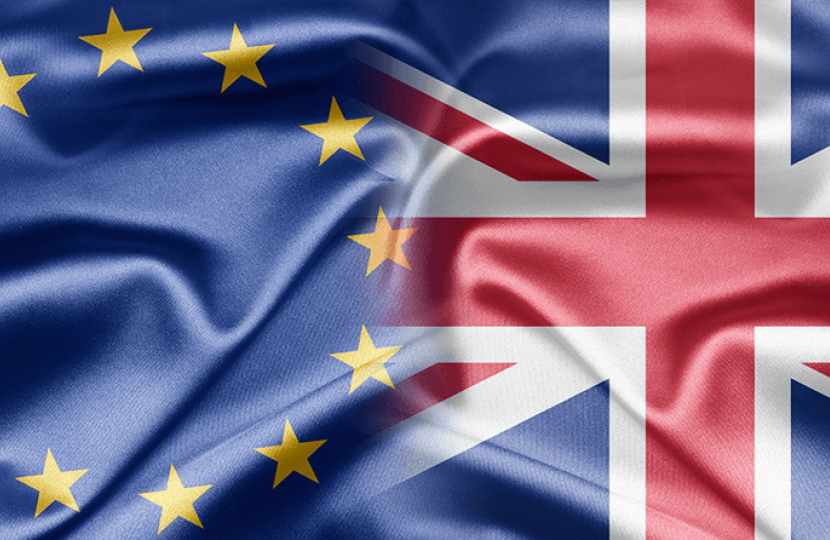
Calls for a second referendum on our membership of the European Union have intensified in recent weeks, so I think it appropriate to make clear my position on the matter.
The first thing to say is that I appreciate some people's sincere desire for there to be a second referendum in order to reverse our withdrawal from the European Union.
I do not support this objective.
Firstly, let's not forget that the House of Commons voted in 2015 (before I was an MP, of course) by an overwhelming margin – 544 to 52 – to give this decision to the people at large, and by almost as great a margin after the referendum to implement the outcome. In the middle of that, of course, the British people turned out in record numbers and voted to leave the EU. Indeed, a greater number of people voted to leave the EU than have voted for any prime minister or party in history.
I would also point out that a second referendum would be the most divisive, hate-fuelled and disillusioning process this country could inflict on itself. Millions of people would be enraged by the perception of an ‘elite’ trying to overturn their opinion, a political system going round in circles, and an impression that consulting them is a sham. After all, it is not democracy when the only accepted answer to EU integration is “Yes”.
The levels of abuse and derision, and the loss of faith in Parliament, would be amplified well beyond anything we have seen in the modern age. The world would look on with bewilderment while one of the great homes of democracy consumed itself with anger in every direction.
In any case the polls, for what they are worth, do not show majority support for a second referendum. This is borne out in West Oxfordshire and as I go around the constituency meeting people I find no appetite for a second referendum. Most people can see that, whilst there are formidable challenges ahead, it is for us as a nation to overcome them rather than surrender and plunge the country into a new and more intense time of division.
I would also politely say to all those arguing for a ‘People’s Vote’ to think very carefully about the practicalities of their proposal. Some leading advocates of the ‘People’s Vote’ have misleadingly suggested that the vote could take place prior to our leaving the European Union in March 2019. This is not true.
There is no standing law in the UK to permit the holding of a referendum. Thus each referendum requires a unique Act of Parliament. Given how hotly-contested the Parliamentary debates would be, particularly over the minutiae of the rules of the vote, it would take several months (at least) for such an Act to be passed.
Then of course there would need to be a full campaign, lasting a number of months, for competing sides to debate and put their case to the electorate. Considering all these things dispassionately, the earliest you could have the ‘People’s Vote’ is a year from now.
This then presents the small matter of needing to extend the Article 50 process, which requires the EU’s permission, whilst we sort out our own affairs. Even if the EU agreed to our request (which is no guarantee, given that Guy Verhofstadt, the EU Parliament’s chief Brexit representative, recently declared that “we will never accept an extension on Article 50”), just think of the immense loss of negotiating power that would be involved in begging the EU27 to extend the negotiating timeline.
This entire process would cast an almighty cloud of uncertainty over our democracy and our economy. Business, which dislikes uncertainty far more than any particular outcome, would be faced with it for a great deal longer.
I would also welcome greater clarity from ‘People’s Vote’ campaigners as to what the question should be. Some say that it should be a ‘take it or leave it’ vote on the final deal, others would rather a re-run of the first referendum, and a multiple choice vote between ‘Remain’, ‘Chequers’ and ‘No Deal’ has also been suggested.
Given the intense argument and difficulty involved even in setting the question, I think those arguing for a ‘People’s Vote’ need to ask themselves whether they really think it will resolve the matter.
The truth is that no-one can be confident that another vote would settle matters. In fact, we can be sure of the very opposite.
There is no evidence of a dramatic shift in public opinion since the vote two years ago. So if we once again voted to Leave then we would be in the exact same position that we are in now – only a year of great uncertainty and division down the line and in a weaker negotiating position. If the vote did indeed result in a vote to Remain, so great would be the outcry of Brexit being abandoned that the campaign for a third ‘winner takes all’ vote would start immediately.
A ‘People’s Vote’ would only lead to greater uncertainty and greater division in the most bitter political campaign in memory. It would deal a perhaps fatal blow to trust in politics and our very democracy. And despite all of this damage and misery, it would not resolve matters.
My firm belief is that we now need to heal the divide - not make it deeper – and come together to make a success of our withdrawal from the European Union.
Robert Courts MP

